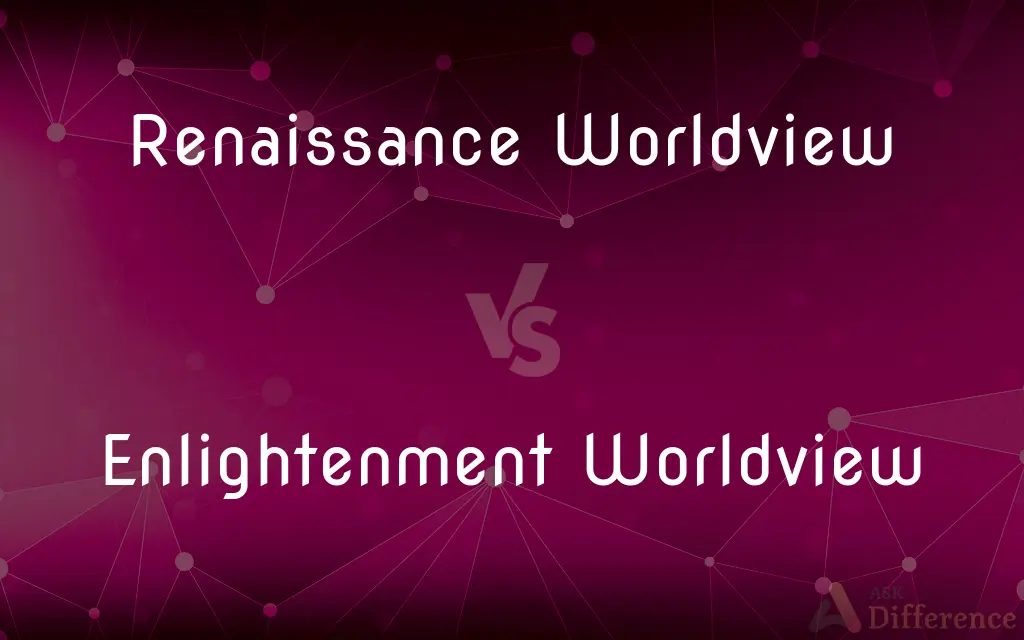Renaissance Worldview vs. Enlightenment Worldview — What's the Difference?
By Tayyaba Rehman — Published on January 30, 2024
The Renaissance worldview emphasized humanism and art, rediscovering classical philosophies; the Enlightenment focused on reason, science, and challenging established beliefs.

Difference Between Renaissance Worldview and Enlightenment Worldview
Table of Contents
ADVERTISEMENT
Key Differences
The Renaissance worldview, emerging in the 14th century, revitalized interest in classical knowledge and emphasized humanism, the value and agency of human beings. The Enlightenment, peaking in the 18th century, focused on intellectual reasoning, scientific inquiry, and skepticism about traditional authorities.
Art and culture flourished under the Renaissance worldview, with a focus on individualism and human creativity. In contrast, the Enlightenment worldview was characterized by an emphasis on empirical evidence, scientific method, and the pursuit of knowledge.
The Renaissance often looked to the past, specifically to Greco-Roman traditions, for inspiration. The Enlightenment, however, looked forward, promoting ideals that shaped modern democratic and secular societies.
While the Renaissance worldview sparked a cultural rebirth and exploration, the Enlightenment worldview led to political and social revolutions, challenging monarchies and traditional hierarchies.
Religion and spirituality were harmonized with human-centered art during the Renaissance. The Enlightenment, meanwhile, encouraged separation of church and state and questioned religious orthodoxy through rational thought.
ADVERTISEMENT
Comparison Chart
Time Period
14th to 17th century
17th to 19th century
Key Focus
Art, humanism, classical knowledge
Reason, science, intellectualism
Approach to Tradition
Revival of Greco-Roman ideals
Skepticism towards tradition, advocating change
Impact on Society
Cultural and artistic rebirth
Political and social revolutions
View on Religion
Harmonized with human-centric art
Promoted secularism, questioned orthodoxy
Compare with Definitions
Renaissance Worldview
Emphasis on rediscovering classical philosophy and art.
The Renaissance worldview inspired a new appreciation for ancient Greek and Roman cultures.
Enlightenment Worldview
Foundation for modern democratic and secular societies.
The Enlightenment worldview laid the groundwork for the separation of church and state.
Renaissance Worldview
Integration of religious themes with human-centered perspectives.
Renaissance worldview art often depicted biblical scenes with a humanistic touch.
Enlightenment Worldview
Emphasis on empirical evidence and skepticism of superstition.
Thinkers of the Enlightenment worldview questioned religious and superstitious beliefs.
Renaissance Worldview
A period valuing humanism and individual expression.
Artists during the Renaissance worldview focused on human beauty and emotions.
Enlightenment Worldview
An era valuing reason, science, and intellectual discourse.
The Enlightenment worldview was instrumental in developing the scientific method.
Renaissance Worldview
A shift towards exploring human potential and achievements.
The Renaissance worldview fostered advancements in both science and the arts.
Enlightenment Worldview
Advocacy for political and social reform based on rationality.
The Enlightenment worldview challenged traditional monarchies and called for democracy.
Renaissance Worldview
Rediscovery and celebration of classical antiquity.
Architecture during the Renaissance worldview reflected the grandeur of ancient Rome.
Enlightenment Worldview
A period promoting individual rights and liberties.
Philosophers of the Enlightenment worldview were pioneers in advocating for human rights.
Common Curiosities
What era followed the Renaissance worldview?
The Enlightenment worldview followed, starting in the late 17th century.
Did the Renaissance worldview influence art?
Yes, it greatly influenced art, focusing on realism, human emotion, and beauty.
When did the Renaissance worldview occur?
From the 14th to the 17th century.
What was the Renaissance worldview?
It was a period focusing on humanism, art, and rediscovery of classical knowledge.
How did the Enlightenment worldview affect science?
It advanced the scientific method and empirical research.
What defined the Enlightenment worldview?
Emphasis on reason, science, and challenging established beliefs and institutions.
Was the Enlightenment worldview a global phenomenon?
Yes, it had a global impact, influencing political and social changes not only in Europe but also in North America and other parts of the world.
Was religion important in the Renaissance worldview?
Yes, religion was harmonized with humanistic perspectives in art and thought.
Did the Enlightenment worldview clash with religious beliefs?
It often challenged traditional religious authority and dogma, promoting secularism and the separation of church and state.
Did the Enlightenment worldview support traditional authority?
No, it often challenged traditional authority and advocated for rationalism and reform.
What role did science play in the Enlightenment worldview?
Science was highly regarded, leading to advancements in various fields, including physics, astronomy, and medicine.
What legacy did the Enlightenment worldview leave for modern society?
Its emphasis on reason, individual rights, and the pursuit of knowledge continues to shape modern democratic societies and intellectual thought.
How did the Enlightenment worldview affect art and culture?
It encouraged a more critical and rational approach to artistic and cultural expression, promoting creativity and innovation.
Share Your Discovery

Previous Comparison
Table Salt vs. Kosher Salt
Next Comparison
Flow Control vs. Congestion ControlAuthor Spotlight
Written by
Tayyaba RehmanTayyaba Rehman is a distinguished writer, currently serving as a primary contributor to askdifference.com. As a researcher in semantics and etymology, Tayyaba's passion for the complexity of languages and their distinctions has found a perfect home on the platform. Tayyaba delves into the intricacies of language, distinguishing between commonly confused words and phrases, thereby providing clarity for readers worldwide.
















































